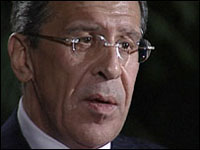Russia blames Kosovo for lack of progress in talks on province's status

"The negotiations can't get off the ground largely due to the fact that the leadership in Pristina insists on independence for Kosovo. That is not a constructive approach," Lavrov said at the Council of Europe, where he was taking over a six-month rotating presidency of the 46-nation human rights watchdog.
Earlier this month, ethnic Albanian and Serbian officials ended their fourth meeting on the future of Kosovo without results after failing to agree on the number of non-Albanian communities that would be given a degree of autonomy under a roadmap for the disputed province, the AP reports.
Three previous rounds of U.N.-mediated talks aimed at reconciling demands by the ethnic Albanian and Serb sides had also failed to reach a formal agreement.
The province remains formally part of Serbia-Montenegro, but its ethnic Albanian majority wants independence, while Serbs living in Kosovo demand that it remain part of Serbia. Ethnic Albanians comprise about 90 percent of Kosovo's population of 2 million.
The U.N.-mediated talks aim to find a solution for Kosovo's disputed status by the end of the year.
Kosovo has been administered by the United Nations since a 1999 NATO air war halted a crackdown by Serb forces on separatist ethnic Albanians.
Subscribe to Pravda.Ru Telegram channel, Facebook, RSS!





